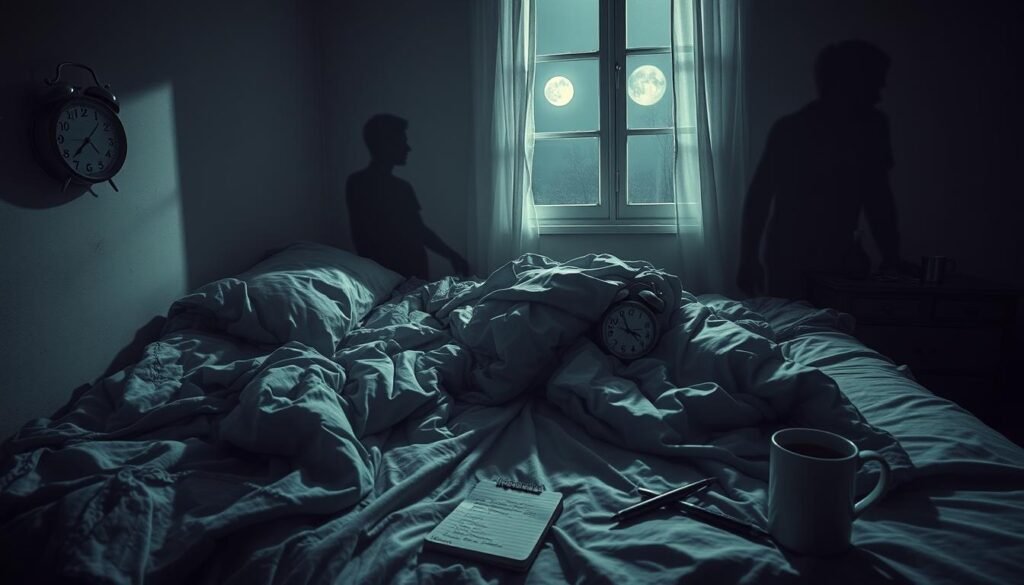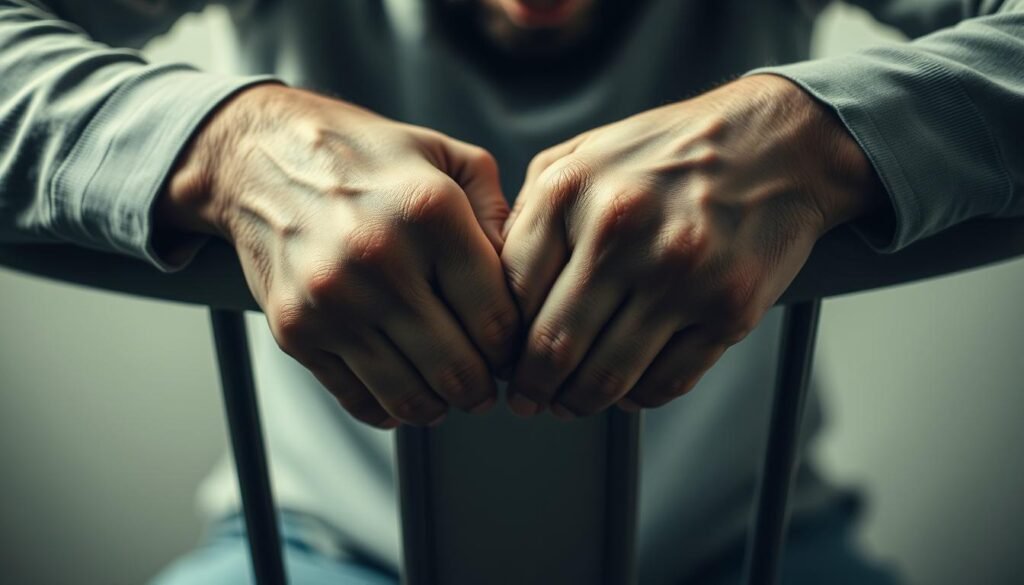Anxiety can show up in many ways. Recognizing the signs is the first step to managing it. You’re not alone, as anxiety affects millions of people in subtle ways.
Anxiety symptoms can be overwhelming. But identifying them is crucial for effective management and finding calm.
Anxiety disorders are characterized by persistent and excessive worry. This worry often interferes with daily activities. Recognizing the signs of anxiety is vital to taking back control and improving your mental health.
By acknowledging the anxiety signs, you can begin to address them. This is the first step towards a more balanced life.
Understanding the signs you have anxiety is the first step towards better mental health. Anxiety can manifest in different ways. Being aware of these signs is crucial for effective management.
By recognizing the anxiety symptoms, you can start to manage them. This is the first step to improving your overall wellbeing.
Key Takeaways
- Anxiety can show up in many ways, and recognizing the signs is the first step to managing it.
- Anxiety symptoms can be overwhelming, but identifying them is crucial for effective management.
- Recognizing the signs of anxiety is vital to taking back control and improving your mental health.
- Understanding the signs you have anxiety is the first step towards better mental health.
- Anxiety can manifest in different ways, and being aware of these signs is crucial for effective management.
- By acknowledging the anxiety signs, you can begin to address them and work towards a more balanced life.
- Anxiety symptoms vary in severity based on stressors and can affect daily life when triggered for a prolonged period.
Understanding Anxiety in Your Daily Life
Anxiety is a normal feeling, but too much of it can be a sign of an anxiety disorder. It’s important to know when you’re feeling anxious. This way, you can manage your feelings and get the help you need. Anxiety disorders are common, affecting nearly 1 in 5 American adults each year.
To understand anxiety better, it helps to know the different types. These include generalized anxiety disorder, social anxiety disorder, and specific phobias.
Here are some key facts about anxiety disorders:
- Anxiety disorders can affect anyone, regardless of age or background.
- Generalized anxiety disorder affects nearly 7 million American adults.
- Social anxiety disorder affects about 15 million U.S. adults.
Creating an anxiety checklist can help you spot the signs of anxiety. This makes it easier to know when you need help. By understanding anxiety, you can start managing your symptoms and improve your wellbeing.
Physical Signs You Have Anxiety
Anxiety shows itself in many ways, from feeling nervous to having a racing heart. You might notice your heart beating fast, breathing quickly, or sweating. These are all signs that you might be anxious.
Some people also get stomach problems or irritable bowel syndrome. These can be signs of anxiety too. It’s important to notice these signs because they might mean you have an anxiety disorder.
By recognizing these symptoms, you can start to manage your anxiety. This can make you feel better overall.
Here are some common physical anxiety symptoms to look out for:
- Increased heart rate
- Rapid breathing
- Sweating
- Trembling
- Digestive issues

These symptoms don’t mean you’re weak. They show your body is reacting to stress or anxiety. By noticing these signs, you can take charge of your anxiety and live a happier life.
The Mental and Emotional Symptoms of Anxiety
As you go about your day, it’s key to spot signs of anxiety. It’s not always easy, but knowing what to look for can help. You might find yourself having trouble sleeping, avoiding friends, or getting stuck on decisions. You could also feel irritable without reason.
Anxiety can make it hard to focus and feel like danger is lurking. You might worry a lot, have racing thoughts, and struggle to decide on anything. These feelings can be tough to handle, making it important to understand how anxiety affects you.

- Feeling restless, nervous, or on edge
- Having difficulty controlling worry or fear
- Experiencing mood swings or irritability
- Struggling with decision-making or concentration
By noticing these signs, you can start to manage your anxiety. Remember, seeing the signs is the first step to beating it. And asking for help shows you’re brave, not weak.
How Anxiety Affects Your Sleep Patterns
Anxiety can really mess with your sleep, making it hard to get a good night’s rest. This can make everyday tasks tough and make anxiety symptoms worse. It’s key to know how anxiety affects sleep to handle anxiety disorders better.
About 43% of adults say anxiety slightly hampers their life. Around 33% say it’s a bit more, and nearly 23% say it’s a lot.
Signs of anxiety that can mess with sleep include racing thoughts and worrying about bad things happening. These feelings can last from a few moments to weeks or even months. Bad sleep can also up the chance of getting a mental health issue, and it’s a common sign of anxiety.
To better sleep and handle anxiety-related sleep problems, try these tips:
- Stick to a regular sleep schedule
- Make a calming bedtime routine
- Stay away from caffeine and screens before bed

Understanding how anxiety and sleep issues are linked is a big step towards managing anxiety symptoms and feeling better overall. Remember, anxiety disorders can be treated, and symptoms can start to get better in just a few weeks of treatment.
Social Withdrawal and Relationship Changes
Feeling anxious and avoiding social situations can be a sign of an anxiety disorder. It’s important to recognize these signs to manage their impact on your relationships and wellbeing.
Social anxiety can make you shy away from social interactions. You might fear being judged or embarrassed. This can harm both personal and professional relationships, making you feel isolated and low on self-esteem.
Some common signs of anxiety include:
- Avoiding social gatherings or events
- Difficulty making or maintaining relationships
- Feeling anxious or fearful in social situations
It’s key to recognize these signs and seek help if you’re struggling with social anxiety. By addressing your anxiety, you can build stronger relationships and improve your mental health.

Remember, you’re not alone in this fight. Many people deal with anxiety and social withdrawal. But with the right support and strategies, you can manage your anxiety and enhance your relationships.
| Common Social Situations | Potential Anxiety Signs |
|---|---|
| Interacting with unfamiliar people | Avoidance, fear of judgment |
| Attending parties or events | Anxiety, fear of embarrassment |
| Starting conversations | Difficulty initiating interactions |
The Connection Between Physical Health and Anxiety
It’s important to see how physical health and anxiety are connected. Anxiety can show up as a fast heartbeat, upset stomach, or chest pain. These signs might mean there’s a health problem that needs attention.
An anxiety checklist can spot health issues. Anxiety might be related to heart disease, diabetes, thyroid problems, or breathing disorders. It can also weaken your immune system, making you more likely to get sick and increasing the chance of metabolic diseases and cancer.
Some key physical health concerns linked to anxiety include:
- Heart conditions like tachycardia and increased blood pressure
- Respiratory issues, such as asthma and breathing difficulties
- Gastrointestinal problems, including irritable bowel syndrome (IBS) and functional dyspepsia
Seeing a doctor is key to finding out if health issues are causing your anxiety. By tackling these physical health problems, you can manage your anxiety better and feel better overall. Remember, taking care of your whole health is important.
Knowing how physical health and anxiety are linked helps you take action. You can make a detailed anxiety checklist to track your symptoms. This way, you can get help when you need it and work towards a healthier life.
| Physical Health Concern | Anxiety Symptom |
|---|---|
| Heart Disease | Rapid Heart Rate, Chest Pain |
| Respiratory Issues | Shortness of Breath, Wheezing |
| Gastrointestinal Problems | Abdominal Pain, Diarrhea |
Daily Habits That May Signal Anxiety
It can be hard to spot anxiety, but some daily habits might hint at it. These signs of anxiety are often small but can really affect your health. For example, eating too much or too little could be a sign. Also, putting off tasks or avoiding certain situations is common in people with anxiety.
Simple ways like deep breathing, journaling, and mindfulness can help with anxiety. Adding these to your daily life can help you spot anxiety and find better ways to deal with it. For example, mindfulness techniques can keep you in the moment, reducing worries about the future or past. Journaling can also help you see patterns and triggers of anxiety, making it easier to tackle them.

- Changes in eating patterns, such as increased or decreased appetite
- Procrastination and avoidance of tasks or situations
- Perfectionist tendencies, such as excessive self-criticism or high expectations
By noticing these habits and using simple strategies to manage anxiety, you can start improving your wellbeing. It’s a big step towards recognizing anxiety and feeling better.
Natural Ways to Manage Anxiety Symptoms
When identifying anxiety and its symptoms, it’s key to look at natural ways to manage them. Anxiety can feel overwhelming, but there are ways to ease it. Deep breathing, journaling, and mindfulness can help reduce anxiety and make you feel calmer.
Regular exercise, like walking or yoga, can also lessen anxiety. Doing things you enjoy can distract you from anxiety and boost your mood. It’s also vital to eat well and get enough sleep to manage anxiety.

Meditation, aromatherapy, and herbal remedies like chamomile are other natural ways to manage anxiety. These methods can help you relax and reduce anxiety. Adding these to your daily routine can improve your wellbeing.
Managing anxiety is a personal journey. It’s important to try different techniques to find what works for you. By actively managing anxiety, you can lessen its impact on your life and enhance your mental health.
When to Seek Professional Help
If you’re dealing with anxiety symptoms, knowing when to get help is key. Spotting anxiety and mental health signs is the first step to healing. If anxiety is affecting your daily life, relationships, or job, it’s time to seek support.
There are many ways to get help, like therapy and medication. Cognitive Behavioral Therapy (CBT), Exposure Therapy, and Mindfulness-Based Stress Reduction (MBSR) are great for managing anxiety. Medications like SSRIs and SNRIs can also help.
Types of Mental Health Support Available
- Cognitive Behavioral Therapy (CBT)
- Exposure Therapy
- Mindfulness-Based Stress Reduction (MBSR)
- Medication options, such as SSRIs and SNRIs
Remember, asking for help is a sign of strength, not weakness. By taking this step, you can start managing your anxiety and improve your mental health and wellbeing.
Building Your Anxiety Management Toolkit
Creating a personalized anxiety management toolkit is key. It helps you recognize and manage anxiety. By understanding your anxiety checklist, you can find ways to deal with anxiety red flags. Simple techniques like deep breathing, journaling, and mindfulness can be very helpful.
Studies show that cognitive-behavioral therapy and mindfulness-based therapies work well. Regular exercise, a healthy diet, and enough sleep also help. It’s important to try different techniques to see what works best for you.
Here are some daily coping strategies:
- Taking short breaks to practice deep breathing exercises
- Engaging in physical activity, such as walking or yoga
- Practicing mindfulness meditation or guided imagery
By adding these strategies to your daily routine, you can better handle anxiety. Remember, everyone’s experience with anxiety is different. So, it’s crucial to make your toolkit fit your specific needs.
Conclusion: Taking Control of Your Anxiety Journey
Recognizing the signs of anxiety is key to managing it. Anxiety disorders are treatable, and many people live fulfilling lives despite them. This is good news for you.
In the UK, up to 1 in 20 people have generalized anxiety disorder. Anxiety disorders are common mental health issues. Organizations like Anxiety UK offer support, including a helpline and chatbot for your questions.
Your anxiety journey is unique. With the right tools and support, you can take charge. Try Cognitive-Behavioral Therapy (CBT) and medication if advised by a professional. Also, use natural methods like mindfulness and lifestyle changes to improve your well-being.
By being proactive and seeking help, you can manage your anxiety and take back your life. The journey may be tough, but with determination and the right resources, you can thrive. Wishing you the best on your anxiety management journey.



